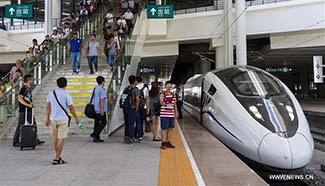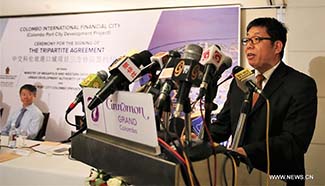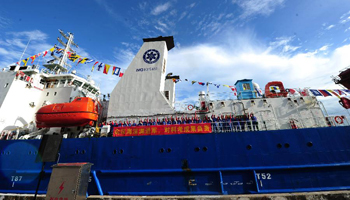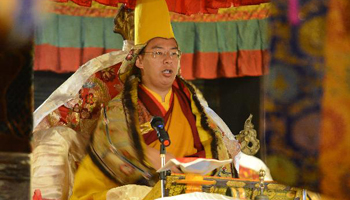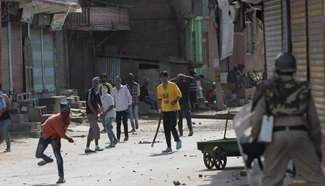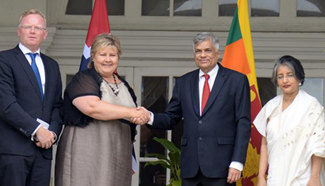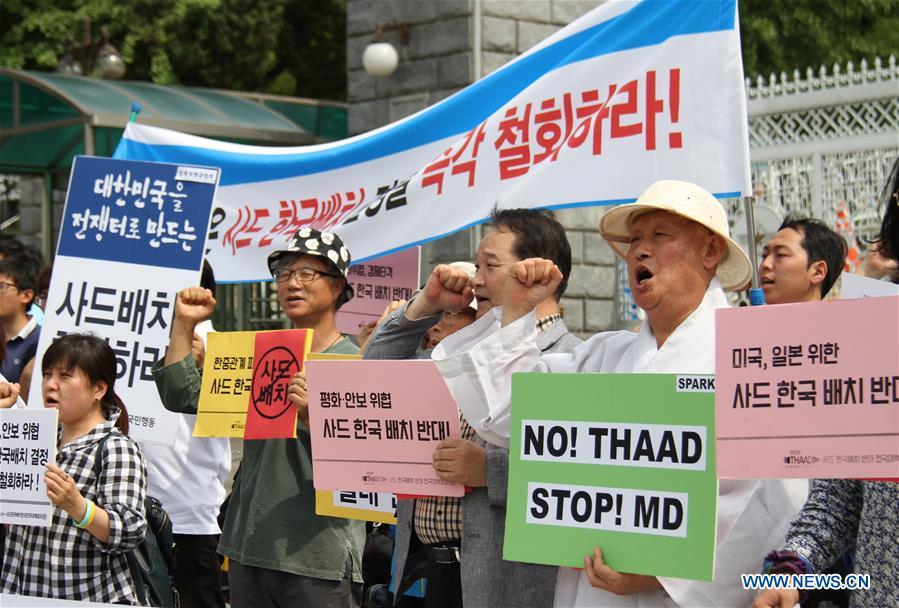
People attend a rally to protest against deploying the U.S. missile defense system, called Terminal High Altitude Area Defense (THAAD), in front of the defense ministry in Seoul, South Korea, July 13, 2016. South Korea's defense ministry on Wednesday announced an agreement with the United States to deploy the U.S. missile defense system, called Terminal High Altitude Area Defense (THAAD), to its southeastern region despite continued opposition from neighboring countries. (Xinhua/Wang Jiahui)
BEIJING, Aug. 12 (Xinhua) -- A three-day visit to Beijing by six South Korean opposition lawmakers has deepened the political divide in the country over the deployment of a U.S. missile defense system.
The lawmakers, all critics of the deployment of the Terminal High Altitude Area Defense (THAAD), were travelling to Beijing at a time when relations between South Korea and China are rapidly deteriorating.
They are, however, being reviled by some South Korean politicians as "betrayers" who could jeopardize national security, and South Korean President Park Geun-hye also criticized them as sympathizers with China.
Such accusations have triggered strong reactions among South Korean opposition parties.
A major South Korean opposition lawmaker said it is possible to impeach President Park over her turning a blind eye to growing public opposition over the deployment of the missile defense system.
Tensions between Beijing and Seoul have reached unprecedented levels after the latter finally decided to deploy the THAAD system on its soil, despite repeated opposition from China.
The South Korean lawmakers said they did not intend to align with Beijing during the trip. Rather, they said, they would seek to meet with Chinese scholars to understand China's stance on the THAAD issue and discuss ways to prevent bilateral relations from worsening further.
Such bilateral communication is what is needed most at this very moment. But the South Korean government and some media outlets branded them as "traitors" and "flunkies for China," a move that only stifles rational voices and acts, and jams the communication channels between Beijing and Seoul.
Seoul's decision to deploy a THAAD unit not only poses a serious threat to China's security and strategic interests, but will end up damaging South Korea's own interests as well.
Many politicians and liberal activists are calling for the government to reconsider deploying the missile defense system, and people around the country have continued holding rallies against the planned THAAD deployment.
According to a Gallup Korea survey released on Friday, only 33 percent of the respondents said they were satisfied with President Park's job performance and 53 percent held an unfavorable view.
Experts said that the THAAD deployment will only worsen tensions on the Korean Peninsula, and South Korea might find itself trapped even deeper within a security paradox.
The South Korean government should realize that the planned THAAD deployment, which will undermine regional peace and stability, could lead the country down a dangerous path. It needs to act with prudence and carefully reconsider the situation before obstinately pushing ahead with the missile defense system.
Related:
Commentary: Seoul invites strategic catastrophe as THAAD threats more than Pyongyang
BEIJING, Aug. 8 (Xinhua) -- The South Korean government is either making a historic misjudgment, or is using it as a weak excuse to state that the deployment of a U.S. anti-missile system could pit Beijing against Pyongyang.
Instead, the decision to deploy the anti-missile system will bring catastrophe to the Korean Peninsula and destroy the hard-won political mutual trust and economic ties between Seoul and its neighbors in Northeast Asia. Full story




